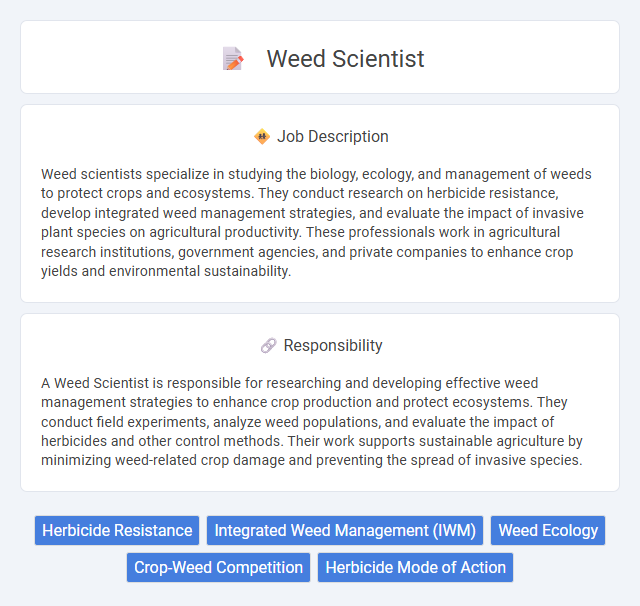
Weed scientists specialize in studying the biology, ecology, and management of weeds to protect crops and ecosystems. They conduct research on herbicide resistance, develop integrated weed management strategies, and evaluate the impact of invasive plant species on agricultural productivity. These professionals work in agricultural research institutions, government agencies, and private companies to enhance crop yields and environmental sustainability.
Individuals with a strong interest in plant biology and environmental science will likely find the Weed Scientist job suitable, as it involves extensive research on plant growth and weed control. People who prefer outdoor work and have patience for detailed data collection might be more inclined to succeed in this role. Those with allergies to plant materials or discomfort with fieldwork may find the job less compatible with their conditions.
Qualification
A Weed Scientist typically requires a minimum of a bachelor's degree in agronomy, plant science, or a related field, with advanced positions favoring a master's or Ph.D. specializing in weed biology, herbicide technology, or integrated weed management. Proficiency in conducting field experiments, data analysis, and knowledge of pesticide regulations are critical qualifications. Experience with GIS technology and strong communication skills are also valued for effective research dissemination and stakeholder collaboration.
Responsibility
A Weed Scientist is responsible for researching and developing effective weed management strategies to enhance crop production and protect ecosystems. They conduct field experiments, analyze weed populations, and evaluate the impact of herbicides and other control methods. Their work supports sustainable agriculture by minimizing weed-related crop damage and preventing the spread of invasive species.
Benefit
A career as a weed scientist likely offers significant benefits including opportunities to contribute to sustainable agriculture by improving crop yields and reducing herbicide resistance. The role probably provides access to cutting-edge research and technology, enhancing professional growth and expertise in plant sciences. It may also offer job stability and favorable compensation due to the increasing global emphasis on agricultural innovation and environmental management.
Challenge
A career as a weed scientist likely involves tackling the complex challenge of managing invasive and resistant weed species that threaten agricultural productivity. The job may require extensive research and experimentation to develop innovative and sustainable weed control methods. Success in this role probably demands adaptability to evolving environmental conditions and regulatory landscapes.
Career Advancement
Weed scientists can advance their careers by specializing in integrated weed management, conducting cutting-edge research on herbicide resistance, or transitioning into leadership roles within agricultural companies and research institutions. Pursuing advanced degrees such as a Master's or Ph.D. often opens opportunities for senior scientist positions, project management, and faculty roles in universities. Expertise in data analysis, biotechnology applications, and regulatory compliance further enhances prospects for career growth and higher earning potential.
Key Terms
Herbicide Resistance
Weed scientists specializing in herbicide resistance conduct research to identify and manage weed populations that have developed resistance to commonly used herbicides. Their work involves studying the genetic mechanisms behind resistance, developing integrated weed management strategies, and advising on the use of alternative herbicides or cultural practices to mitigate resistance spread. This role is critical in ensuring sustainable agricultural productivity and minimizing economic losses caused by resistant weed species.
Integrated Weed Management (IWM)
Weed Scientist specialists focus on Integrated Weed Management (IWM) strategies to control and reduce weed populations sustainably in agricultural systems. They conduct research on herbicide resistance, crop rotation, mechanical control, and biological methods to optimize weed suppression while minimizing environmental impact. Their expertise supports developing cost-effective and eco-friendly weed control plans that enhance crop productivity and soil health.
Weed Ecology
Weed scientists specializing in weed ecology study the interactions between weed species and their environments to develop sustainable management strategies. They analyze factors such as weed population dynamics, seed dispersal mechanisms, and the impact of environmental conditions on weed growth. Research in weed ecology informs the development of integrated weed management practices that minimize herbicide use and promote agricultural biodiversity.
Crop-Weed Competition
Weed Scientists specialize in understanding crop-weed competition, analyzing how different weed species affect crop growth and yield through resource competition such as light, water, and nutrients. They develop integrated weed management strategies combining chemical, cultural, and mechanical control methods to minimize crop losses and promote sustainable agriculture. Research in this field advances herbicide resistance management and optimizes agronomic practices to enhance crop productivity and environmental health.
Herbicide Mode of Action
Weed scientists specialize in understanding herbicide mode of action to develop effective weed management strategies. They analyze how specific herbicides disrupt biological processes in target weed species, optimizing application techniques to maximize efficacy and reduce resistance. Expertise in biochemical pathways, such as photosynthesis inhibition and amino acid synthesis disruption, is critical for advancing sustainable agricultural practices.
 kuljobs.com
kuljobs.com